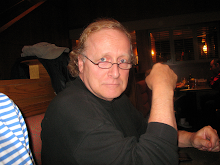Meet the Bloggers » Midtown Brews: Hunter Morrison--I first became acquainted with
Hunter back in the late 1970s; I was recently arrived back in town from Atlanta, a newly minted Realtor with a focus on older properties, hanging out with all the young visionaries promoting Ohio City, downtown living at The Park & The Chesterfield, the reintegration of Hough, Clevelanders for 1,000 Families (Garrett Brodhead), adaptive reuse, and all the other cool things that were happening in Boston and Baltimore. Then, Hunter fell silent for a while, but now he's back, and he's speaking the truth, embellished only by a happy turn of phrase every now and then. This podcast of our February 1st sit over at Webtego's conference room is something we all must listen to, and then listen to again. There's history, hubris, and a glimpse of the future of the region.
Mentioned are his directorship at the
Center for Regional Studies, David Sweet, Youngstown State, George McKelvey, the Hough Development Corporation and Kucinich, the planning award garnered by Youngstown 2010, "co-convening," the condition of Youngstown prior (peeling paint, bad attitude, and no place to go but up), Urban Strategies out of Toronto, and the vision statement of Youngstown, which entails the extraordinarily liberating effect of accepting that they're a shrunken, small city. There's also the
I Will Shout Youngstown blog, the European experiences from Newcastle and from Dresden, and the idea of dying and reviving cities aligned with the idea of dying and reviving gods in our culture, along the lines of
Sir James George Frazier's Golden Bough. I think that somewhere around here comes mention of the old Cleveland networks and David Hoag, Alton Whitehouse, and Joseph Gorman, and a distinction made between the old hierarchical and the new networked structures. Then come Jay Williams, Tim Ryan, Alvin Toffler, and phrases like "a buzz going on," "anomaly of the comeback city," "take the dreams and boil them down to the deals," "you've got to celebrate your successes," "megapolitan areas," "the commutership," and what happens when "the 'me' gets replaced by the 'we.'" He also talks of Jim Rouse and Faneuil Hall, Hope 6, the exploitative history of milltowns and the steel industry, black boxes, identity,
Volney Rogers and the first metroparks, intrinsic value, the concept that "retail follows rooftops," values, authenticity, being very siloed and very parochial, and
Tim Ryan's basic question of "Who are we collectively?"
There's incredible value in this podcast. There's also passion, concern, and a bit of outrage. This is one of the more significant offerings of the MTB "portfolio"--make sure you listen to it soon.





